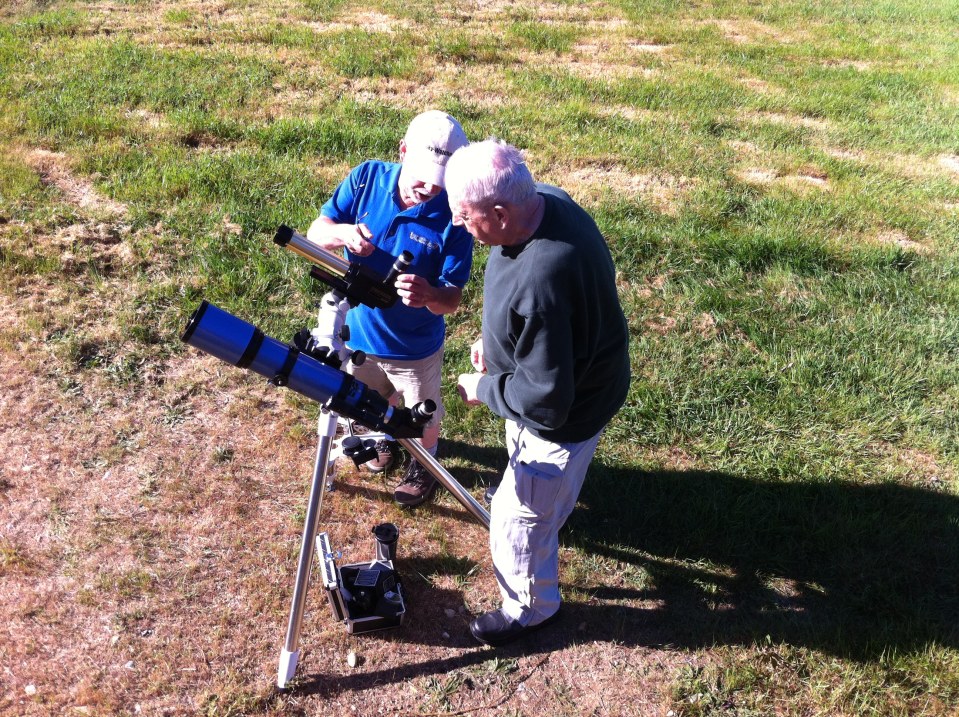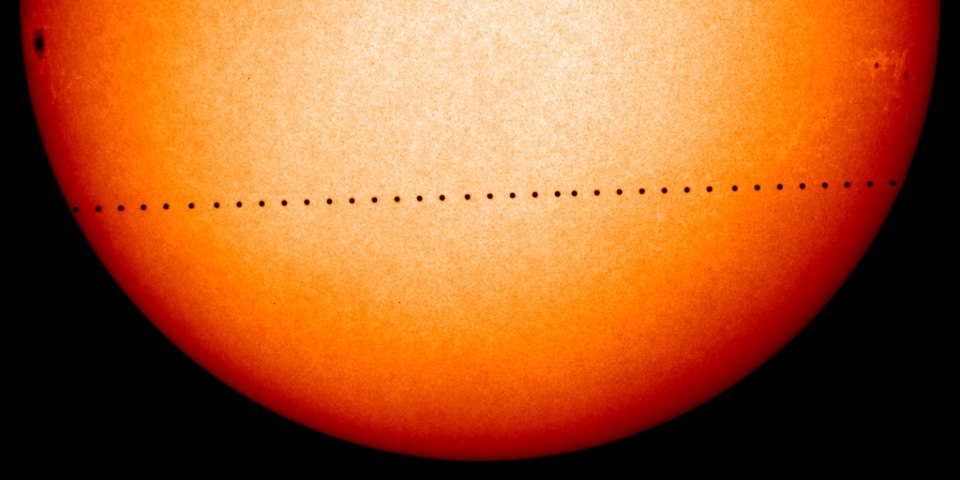Home » Posts tagged 'Mercury'
Tag Archives: Mercury
Mercury Transit: 11 November

Mercury transiting the Sun in 2016. That black dot on the lower left is Mercury: the other dots are sunspots. Photo by Mike Bradley.
Only the inner planets, Mercury and Venus, can cross the solar disk. Transits of Venus are among the rarest of predictable astronomical phenomena, occurring in a pattern repeating every 243 years, with pairs of transits eight years apart separated by long gaps of 121.5 years and 105.5 years. Mercury, on the other hand, transits the solar disk approximately 13 times per century. The last transit of Venus occurred on 2012 June 5-6 and the next will occur on 2117 December 10-11. The last transit of Mercury occurred 2016 May 9 and our astronomers viewed that from our SCC Observatory at Sechelt Airport. Mercury is next due to transit the Sun on 2019 November 11, and the Sunshine Coast Astronomy Club will be in Roberts Creek to help people view it. After this, the next Mercury transit isn’t until 2032 November 13, so you won’t want to miss this.
Only viewers in Ontario, Quebec and Atlantic Canada will be able to view the entire 5 ½ hour event, as the Mercury transit starts at sunrise in that area. Here in BC the transit will be in progress when the Sun comes up: We’ll still be able to view nearly 3 hours of transit. Our astronomers chose a location which would give us the best unobstructed view as the Sun rises to make sure that we capture as much of this transit event as possible. We’ll be setting up at the Roberts Creek pier at sunrise at 07:00 on 11 November with our solar scopes. Everyone is welcome to join us to view this event. We’re hoping for clear skies that morning.

Sunshine Coast Centre astronomers setting up solar telescopes to view the Mercury transit in 2016.
A transit of Venus can be viewed with eclipse glasses, but Mercury is too small to view in this fashion. To view a Mercury transit, you’ll need to equip your binoculars or telescope with a front aperture solar filter, use a telescope with a Herschel Wedge and filter, or use a hydrogen alpha telescope designed for solar viewing. Our members will have these solar telescopes set up to allow the public to safely view the Mercury Transit.
We’ll post updates here as the day approaches.
UPDATE: 3 pm Sunday, 10 November:
A few days back the forecast did not look good at all for Monday morning, with rain forecast. This has gradually improved as we close in on Monday morning, but still looking problematic. Before 3 am on Monday the Clear Outside forecast site is showing 100% high cloud through the day, which would make solar flares impossible to see but could allow us to see Mercury transiting the Sun. However, the forecast for medium cloud cover rises Monday morning from 17% at 4 am to 98% at 7 am, which would definitely prevent viewing. Clear Dark Sky shows transparency Monday morning as “too cloudy to forecast” from 4 am onwards, and seeing after 6 am as “too cloudy to forecast”. I’m going to check the skies between 4 am and 5 am Monday Morning to make a final decision. I will post an update here by 5.
UPDATE: 5 am Monday, 11 November:
Viewed the sky at 3:45 am and you could just make out Vega at the zenith and one other fuzzy star (Altair?) but no others at all and a glow in the western sky behind the clouds from the nearly full Moon, but no view of the Moon itself. At 5 am the Moon had set and both stars had completely disappeared. Clouds are closing in as predicted.
UPDATE: 7 am Monday: We have some clear sky to the east! We’re going for it! See you at Roberts Creek pier!
Transit of Mercury:Monday, 9 May 2016
 The planet Mercury passes between the face of the Sun and Earth only 14 times per century, and one of those events is about to occur as the Sun rises on May 9. When the Sun rises at 5:30 AM on Monday, 9 May, the transit will already be in progress (having started about 4:12 AM). The transit will end at 11:42 AM. We’ll have the SCC Observatory open for public viewing that morning (weather permitting) with our solar scopes for safe viewing.
The planet Mercury passes between the face of the Sun and Earth only 14 times per century, and one of those events is about to occur as the Sun rises on May 9. When the Sun rises at 5:30 AM on Monday, 9 May, the transit will already be in progress (having started about 4:12 AM). The transit will end at 11:42 AM. We’ll have the SCC Observatory open for public viewing that morning (weather permitting) with our solar scopes for safe viewing.

